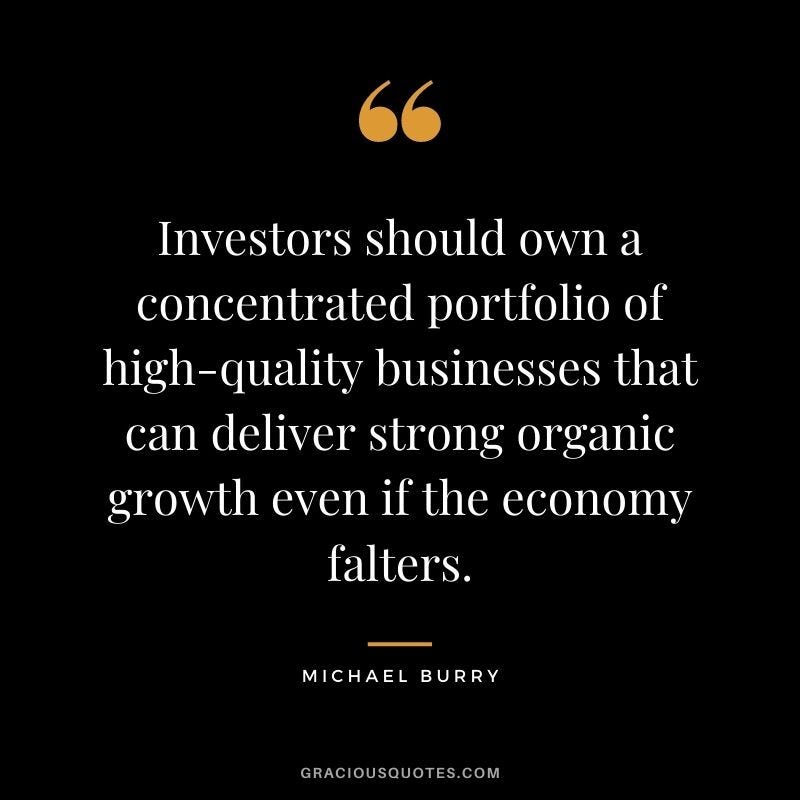Unraveling the Genius: How Michael Burry Picks Deep Value Stocks
*This is a short premium post that is being shared with free subscribers as well. If you enjoyed it and are curious to read more of the Burry, politician, & Buffett pieces to come, feel free to try a 7 day free trial on us 🫡
Michael Burry, renowned for his remarkable success during the 2008 financial crisis, has become an investing legend. As the protagonist in Michael Lewis's book "The Big Short" and portrayed by Christian Bale in the movie adaptation, Burry gained widespread recognition for predicting the housing market crash and subsequently profiting from it. But Burry's talent extends beyond his subprime mortgage bets; his ability to identify undervalued companies and pick deep value stocks has set him apart as a gifted value investor. In this article, we will delve into Michael Burry's approach to selecting deep value stocks and uncover the principles that underpin his investment strategy.
Understanding Deep Value Investing
At its core, deep value investing involves seeking out stocks that are trading at significant discounts to their intrinsic value. This investment philosophy stands in stark contrast to growth investing, where investors target companies with high earnings potential, often leading to higher valuations. Value investors like Michael Burry, instead, seek overlooked or misunderstood companies whose stock prices do not reflect their true worth.
Rigorous Fundamental Analysis
Burry's approach to deep value investing is deeply rooted in fundamental analysis. He meticulously scrutinizes a company's financial statements, looking for clues about its overall health, cash flow, debt levels, and earnings potential. By understanding the company's fundamentals, Burry can identify whether the market's valuation accurately reflects its intrinsic value.
Contrarian Perspective
Burry is no stranger to contrarian investing. He actively seeks opportunities where the market has a negative sentiment towards a company, leading to an undervaluation. Contrarian investors often go against the herd mentality, which requires significant conviction in their analysis and belief in the company's long-term potential. This approach proved successful during the financial crisis, where Burry's bets against the housing market went against prevailing sentiment.
Patience and Long-term Horizon
Deep value investing is not a quick path to riches; it requires patience and a long-term investment horizon. Burry is known to hold positions for extended periods, sometimes years, waiting for the market to recognize the true value of the company. This patient approach allows him to capitalize on potential price discrepancies over time.
Concentrated Portfolio
Unlike some investors who diversify their holdings extensively, Burry maintains a more concentrated portfolio. By focusing on a select number of deep value stocks, he can dedicate more time and research to each investment, maximizing his understanding of the companies in which he invests.
Focus on Margin of Safety
The concept of a margin of safety is paramount to Burry's investment philosophy. He aims to buy stocks at prices substantially below their intrinsic value, which provides a margin of safety against potential adverse events or market fluctuations. This safety buffer minimizes the downside risk and increases the likelihood of profitable returns.
Unearthing Hidden Opportunities
Burry has a knack for spotting hidden opportunities where others may not look. He dives into niche industries or overlooked companies, where he can find potential gems. This approach allows him to avoid competition with other investors and capitalize on inefficiencies in the market.
Conclusion
Michael Burry's success as a deep value investor can be attributed to his rigorous fundamental analysis, contrarian perspective, patience, focus on a margin of safety, and ability to uncover hidden opportunities. His investment philosophy, which he demonstrated during the 2008 financial crisis, continues to be admired and studied by aspiring value investors. However, it is essential to note that investing is inherently risky, and even the most skilled investors may face challenges and losses. Therefore, it is vital for individual investors to conduct thorough research, exercise prudent risk management, and align their investment strategies with their financial goals. Michael Burry's journey serves as an inspiration and a valuable learning opportunity for investors seeking to master the art of deep value investing.






